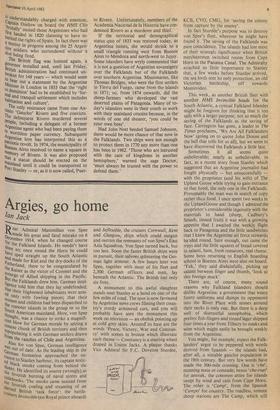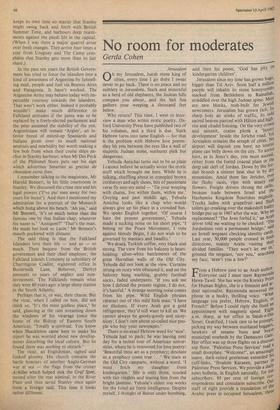Argies, go home
fan Jack
Rear Admiral Maximilian von Spee r, Made his great and fatal mistake on 6 for 1914, when he changed course tor the Falkland Islands. He needn't have done so; once round the Horn he could have sped straight up the South Atlantic and made for Kiel and the dry-docks of the Fatherland, there to be congratulated by the Kaiser as the victor of Coronel and the scourge of Allied shipping in the Pacific. But the Falklands drew him. German intel- ligence told him that they lay undefended; at their frightened inhabitants were arm- ed Only with fowling pieces; that their Women and children had been dispatched to e remoter islands in the group or to the South American mainland. Here, von Spee thought, was a chance to strike a magnifi- cent blow for German morale by seizing a remote chunk of British territory and then repopulating it with German settlers drawn from the ranches of Chile and Argentina. Alas for von Spee, German intelligence pas out of date. As the leading ship in the -Ierman formation approached the en- trance to Stanley harbour, its captain none- u black smoke coming from behind the h,Ines. He identified its source (wrongly) as e feverish burning of naval stores and reebooks. The smoke came instead from al feverish coaling and steaming of an erted British 'task force': the battle- cruisers Invincible (no Royal prince aboard) and Inflexible, the cruisers Cornwall, Kent and Glasgow, ships which could outgun and outrun the remnants of von Spee's East Asia Squadron. Von Spee turned back, but too late. Soon the faster British ships were in pursuit, their salvoes splintering the Ger- man light armour. A few hours later von Spee, together with most of his fleet and 2,300 German officers and men, lay beneath the Atlantic. The British lost only six lives.
A monument to this awful slaughter stands near Stanley at a bend on one of the few miles of road. The spot is now favoured by Argentine news crews filming their coun- try's sturdy armoured cars, and you will probably have seen the monument this week on television — an obelisk pointing up at cold grey skies. Around its base are the words 'Peace, Victory, War and Constan- cy' with scenes in bronze which illustrate each theme — Constancy is a steering wheel draped in Union Jacks. A plaque thanks Vice Admiral Sir F.C. Doveton Sturdee, KCB, CVO, CMG, for 'saving the colony from capture by the enemy'.
In fact Sturdee's purpose was to destroy von Spee's fleet, wherever he might have found it. The saving of the Falklands was pure coincidence. The islands had lost most of their strategic significance when British merchantmen switched routes from Cape Horn to the Panama Canal. The Admiralty attached so little importance to Stanley that, a few weeks before Sturdee arrived, the sea lords sent its only protection, an old Victorian battleship, off towards Montevideo.
This week, as another British fleet with another HMS Invincible heads for the South Atlantic, a cynical Falkland Islander might be forgiven for thinking that it too sails with a larger purpose; not so much the saving of the Falklands as the saving of face. Carrington has gone, a leader in The Times proclaims, 'We Are All Falklanders Now' (going on to quote John Donne and the bell that tolls for us all), but we seem to have discovered the Falklands a little late.
Sometimes it all seems quite unbelievable; nearly as unbelievable, in fact, as a recent story from Stanley which suggested that an Argentine journalist had fought physically — but unsuccessfully with the proprietor (and his wife) of The Upland Goose while trying to gain entrance to that hotel, the only one in the Falklands. Presumably the man was in search of copy rather than food. I once spent two weeks in the Upland Goose and though I admired the proprietor's considerable ingenuity with the materials to hand (sheep, Cadbury's Smash, tinned fruit) it was with a growing appetite that I awaited the weekly flight back to Patagonia and the little sandwiches that I knew the Argentine air force stewards hauled round. Sure enough, out came the trays and the little squares of bread covered in salami, ham, fresh tomatoes, real cheese. Some boys returning to English boarding school in Buenos Aires were also on board.
• Yuk,' they said disdainfully, picking up salami between finger and thumb, 'look at this foreign muck'.
There are, of course, many sound reasons why Falkland Islanders should dislike Argentina: a government that wears funny uniforms and dumps its opponents into the River Plate with stones around their necks is only one. But there is a deep well of distrustful xenophobia, which prefers fish-fingers and tinned lager shipped four times a year from Tilbury to steaks and wine which might easily be brought weekly from the Argentine.
You might, for example, expect the Falk- landers' argot to be peppered with words derived from Spanish — the islands had, after all, a sizeable gaucho population in the 19th century. But very few words have made the 300-mile crossing. One is `che', meaning mate or comrade; hence `che-coat' for anorak, the common attire for islands swept by wind and rain from Cape Horn. The other is `Camp', from the Spanish `Campo' for country. The roadless, remote sheep stations are The Camp, which still
keeps its own time no matter that Stanley might swing back and forth with British Summer Time, and harbours deep resent- ments against the plush life in the capital. (When I was there a major quarrel arose over fresh oranges. They arrive four times a year from Uruguay and The Camp com- plains that Stanley gets more than its fair share.)
In the past ten years the British Govern- ment has tried to force the islanders into a kind of awareness of Argentina by funnell- ing mail, people and fuel via Buenos Aires and Patagonia. It hasn't worked. The Argentine Army may behave today with im- peccable courtesy towards the islanders. That won't work either. Indeed it probably wouldn't make much difference to Falkland attitudes if the junta was to be replaced by a freely-elected parliament and the peso assumed the stability of the yen. Argentinians will remain 'Argies', an in- ferior breed of mixed-up Spaniards and Italians given over to much national neurosis and morbidity but worth making a few bob from when their cruise ships an- chor in Stanley harbour, when Mr Des Peck of the Philomel Store puts out his sign which advertises Smarties as grazias de chocolate extra fino.
I remember talking to the magistrate, Mr Harold Bennett, in his little courtroom in Stanley. We discussed the crime rate and his legal powers (Tye put men away for two years for incest'). And then I mentioned my admiration for a portrait of the Monarch which hung above his bench. `Ah yes,' said Mr Bennett, 'it's so much better than the famous one by that Italian chap, whatever his name is.' 'Annigoni?"That's the man. He made her look so Latin.' Mr Bennett's mouth puckered with distaste.
The odd thing is that the Falkland Islanders love their life — and us — so much. Their bequest from the British government and their chief employer, the Falkland Islands Company (a subsidiary of Charrington Coalite, registered office in Buttermilk Lane, Bolsover, Derby) amounts to years of neglect and non- investment. The Falklands remain what they were 80 years ago: a large sheep station in the South Atlantic.
Perhaps that is, or was, their charm. But the vicar, when I called on him, did not think so. 'It's the most godless place,' he said, glancing at the rain streaming down the windows of his vicarage (once the home of the Bishop of Eastern South America). 'Totally a-spiritual. You know when Shackleton came here to make his report he was worried about new develop- ments disturbing the local culture. But he found there was nothing to disturb.'
The vicar, an Englishman, sighed and looked gloomy. His church contains the battle honours of another Anglo-German war at sea — the flags from the cruiser Achilles which helped sink the Graf Spee, named after the rear admiral, in the River Plate and thus saved Stanley once again from a foreign raid. This time it looks rather different.



































 Previous page
Previous page